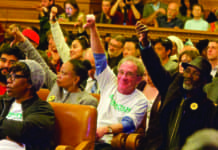
by Griffin Jones
Dozens of chronically homeless veterans and people with disabilities in properties around Bayview face eviction as the nonprofit Felton Institute takes over operations at 2111 Jennings St., former site of homeless outreach organization United Council of Human Services.
“I wake up at night thinking somebody’s gonna kick me out of my house,” said Wendy Tanksley, 53, a resident of 1371 Revere Ave. A native of the Fillmore, Tanksley was living on the streets and in her car for years before securing housing through Hope House, a program run by the United Council.
Until United Council’s closure earlier this year following lawsuits alleging CEO Gwendolyn Westbrook’s costly mishandling of the organization, Hope House kept anywhere from 50-75 people off the streets and in long-term leases.
A majority of those housed by the nonprofit are Black. Most are seniors, and all are enrolled in some form of government assistance.
Tanksley had the opportunity to check out potential housing through her Hope House case manager, but she’s not happy with the options. All SRO rooms she’s viewed are in the Tenderloin, and Tanksley said she’d rather stay put on Revere, where she lives with three other women.
“I’ve been paying rent here for four years,” said Tanksley. “I was homeless – sleeping in my car and everything. Now I’m 21 years clean, in recovery – I can’t afford to live downtown with all the people selling drugs.”
In early November, residents at multiple Hope House properties around Bayview received form letters from Felton Institute stating that all leases on buildings formerly managed by Hope House were ending. The letter went on to say that residents who did not follow up through the contacts listed on the letter would have to vacate the properties by Dec. 1.
Felton Institute declined to comment. It is unclear how many of the 70-odd people in the program received letters, but they Bay View was able to confirm over 30.
Joseph Williams, 66, who lives in a Hope House property at 1315 Revere Ave., raised an alarm among residents when he got notice that the lease on the house he’d lived in for 14 years was ending. He would either have to re-enroll through Felton and be re-housed or be on his own by the month’s end.
Williams sent a petition out to local organizations and Supervisor Shamann Walton, hoping the cause could be taken up at the city level. So far, he hasn’t heard anything promising.
Williams said he’s trying not to let it get to him too much – he’s been hospitalized twice in the last month for high blood pressure – but he’s enraged.
“Can I be on the record?” he asked. “I want people to know. I’ve been disabled for years, and I don’t want to move.”
“What I don’t understand is, why can’t they renegotiate the lease with our current landlord? They said the lease ended, but when I called my landlord, he said he had no knowledge of the situation.”
The landlord in question, Maxwell Chikere, confirmed that he didn’t receive any letter from Felton Institute until late November – after he got calls from his tenants. Four veterans live in the building on Revere, and Chikere said he’s known them for years. According to residents and Chikere, they have positive relationships.
“I feel for those guys,” Chikere said of his tenants. “It’s a shame. Here, they have a roof over their heads, every day, every month, every year. Why wouldn’t [Felton] just renegotiate with me?”
Chikere said he won’t be selling the building, which is currently home to four veterans, so he will likely have to put it up for lease again.
Just around the corner, Jose Reyes, 67, angrily relayed his experience. Both he and his roommate are Army veterans and have been part of Hope House for eight years. They live together at 1401 Shafter Ave.
“I’m way past confused,” said Reyes. “My last understanding is that we lost our housing. Period. I have an appointment today with inside housing. I arranged it – Felton hasn’t done anything,” said Reyes.
The number listed on Felton Institute’s notice of eviction sent callers to a number that Reyes said went nowhere. When the Bay View attempted to call the number, it was disconnected.


When Reyes inquired with a newly assigned case manager, who he said was “just as in the clouds as we were,” he was told to disregard that letter as a “mistake,” but not given any explanation or follow-up.
“What do you mean, ‘disregard the letter’?” said Reyes. “They’re talking about throwing us out of our housing.”
The first letter from Felton Institute, dated Nov. 9, told Reyes he had to be out by Dec. 5 if he and others had “not yet engaged or agreed to participate with HSH for housing assistance by 11/15/2023.”
“We’ve gotten very comfortable; we’re cool with the neighbors, we have the place set up right for us.” Reyes’ voice cracked. “I have no idea where we’re gonna end up. I’m gonna probably end up losing a lot of what I’ve worked so hard for.”
Hope House, a Black run-and-operated organization, started up in 2004 with funds from Housing and Urban Development (HUD).
Through HUD funds, Hope House formerly footed around two-thirds of the rent for each person in the program. But, as the nonprofit has been embroiled in scandal for the past year, the bill now goes to Felton Institute.
Reyes said he was among those impacted by United Council’s financial misdeeds – including questionable rent hikes – and continues to pay the price.
Reyes works as a maintenance technician, typically earning around $1,400 a month. He’s grateful he’s still able to work and get around. For others, he said, this transition is going to be much harder.
“The threat of being put out into the street? For someone who’s elderly and not as able, this has got to be super stressful,” he said. In early December, Reyes arranged an appointment with a separate housing organization to figure out his next steps.
“Be it a person in pain who’s on dope, or a senior like me who has never even tried one cigarette and lost my house – everyone deserves housing,” said one resident of 1371 Revere Ave., 78, who asked to remain anonymous.
“I wait every day to hear what happens.”
Griffin Jones is a freelance reporter formerly of Mission Local and the San Francisco Bay View. She can be reached at griffinforrestjones@gmail.com.

 Store
Store












